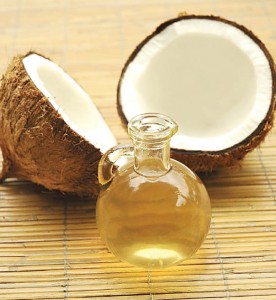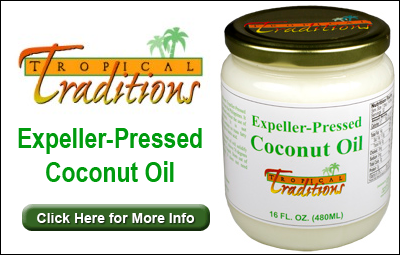The BEST Cooking Oil for Hypothyroidism
Written by Tom Brimeyer | Posted in Diet & Nutrition | 4 Comments
 It’s no secret that the rate of virtually every disease continues to rise year after year. In a previous post, I mentioned that oftentimes if you want to achieve the opposite results with your health, you must take opposite action. A perfect example of this can be seen by looking at the fats in your diet. Coconut oil is by far one of the best fats, or cooking oils, for hypothyroidism because of the fact that it’s highly saturated.
It’s no secret that the rate of virtually every disease continues to rise year after year. In a previous post, I mentioned that oftentimes if you want to achieve the opposite results with your health, you must take opposite action. A perfect example of this can be seen by looking at the fats in your diet. Coconut oil is by far one of the best fats, or cooking oils, for hypothyroidism because of the fact that it’s highly saturated.
Not only is coconut oil a very saturated fat containing 96% or more saturated fat, but it contains next to no polyunsaturated fats (PUFAs), which we know are quite thyroid suppressive on multiple levels.
Before you start cringing and squirming in your seat at the idea of using a saturated fat in your diet, let’s think about it for just a second and use a little common sense for once.
We know that unsaturated fats oxidize easily and promote cell damage. The reason they oxidize so easily is because of their weak and unstable chemical structure. Saturated fats on the other hand are extremely stable and do not oxidize. So, by simply eating coconut oil instead of PUFAs, you’re protecting yourself from accelerated aging and a number of other health problems associated with the oxidative damage caused by PUFAs in your diet.
But won’t coconut oil, being a saturated fat, clog your arteries and cause heart disease?
Unfortunately, that’s what more than a half of a century of brain washing will do to you. But it’s a good thing that you’re too smart to let that continue to happen, right?
In fact there’s lots of research on coconut oil and how it protects against heart disease.
Medium chain triglycerides (MCT) in aging and arteriosclerosis.
http://www.ncbi.nlm.nih.gov/pubmed/3519928
The Demographic Yearbook of the United Nations (1978) reported that Sri Lanka has the lowest death rate from ischemic heart disease. Sri Lanka is the only of the countries giving reliable data where coconut oil (containing over 50% medium chain fatty acids) is the main dietary fat.
What baffles me even more is that regardless of the research, the benefits of coconut oil are still being greatly down-played by the medical community.
In fact, here’s a quote directly from a Mayo Clinic endocrinologist regarding the potential benefits of coconut oil with hypothyroidism:
The misconception that coconut oil can cure underactive thyroid (hypothyroidism) arose after publication of a book several years ago touting the beneficial effects of coconut oil. However, there is no evidence that coconut oil stimulates thyroid function.
– Mayo Clinic Endocrinologist
Even the FDA has stated that coconut oil, being a saturated fat, should be avoided.
How Coconut Oil Helps Hypothyroidism
Unfortunately, our lack of understanding of physiology and common sense are really what are holding us back from seeing and understanding the benefits that coconut oil provides for hypothyroidism.
Sometimes you have to look beyond the direct effect on the thyroid gland itself and look at the bigger picture. Most of the benefits that coconut oil provides have more to do with its ability to help regulate and correct your physiology to prevent other external influences from suppressing your thyroid.
Here are a few examples of how coconut oil directly or indirectly improves thyroid function.
- Coconut oil displaces PUFAs and their direct harmful thyroid suppressive effects.As I mentioned above, these so called “heart healthy” polyunsaturated fats that are being promoted are well known to suppress your thyroid on multiple levels: at your gland, in your bloodstream, and at your cells.
By simply eating more coconut oil, you are effectively increasing the ratio of saturated fatty acids to unsaturated fatty acids and therefore displacing the PUFAs in your body which directly improves your thyroid function on all levels.
- Coconut oil helps regulate blood sugar and stress hormones which suppress thyroid function.PUFAs are also very effective at lowering blood sugar, and by replacing PUFAs in your body with the saturated fat from coconut oil, it helps to regulate blood sugar and therefore suppress stress hormones.
Stress hormones can directly inhibit the thyroid gland by suppressing TSH. They suppress thyroid hormone conversion in the liver. They also increase Reverse T3 production. In general, hypothyroidism sufferers overproduce stress hormones.
Many people experience a greater sense of satiety and improved blood sugar control after replacing PUFAs with coconut oil in their diet.
- Coconut oil protects cell mitochondria against stress and injury, both of which suppress thyroid function.I talk a lot about the health of your thyroid being largely dictated by your cells ability to utilize thyroid hormone.
PUFAs cause cell damage and alter metabolism on many levels. For starters, I’ve already mentioned that they cause oxidative cell damage which directly damages the cell mitochondria and inhibits your cells ability to utilize thyroid hormone properly.
 This is why everyone is so gung-ho on antioxidants today. Everyone is unknowingly pumping their bodies full of bad oils that are causing the very oxidative damage that these antioxidants are trying to protect against.
This is why everyone is so gung-ho on antioxidants today. Everyone is unknowingly pumping their bodies full of bad oils that are causing the very oxidative damage that these antioxidants are trying to protect against.Coconut oil acts as a potent antioxidant by helping to offset the pro-oxidative effects of the PUFAs, which in turn improves mitochondria and cell health, and promotes the healthy use of thyroid hormone by your cells.
Fractions of coconut oil are now even being used by medicine in the treatment of many kinds of cancers, which in itself goes to show you that coconut oil does play a direct role in improving cellular energy production and therefore improving thyroid function.
What Kind of Coconut Oil Is Best?
As with most health foods, as they become increasing popular, more and more low quality products begin to hit the market. Coconut oil is no different. This is why it’s important to get coconut oil from a reputable source, since the chemical processing often negates the benefits of the oil itself and introduces other potential harmful components.
This is what has driven most people to rely on unrefined virgin coconut oil, but even this isn’t ideal for most people since unrefined coconut oil still contains coconut  particulate which can irritate the digestive tract and increase estrogen and stress hormone production.
particulate which can irritate the digestive tract and increase estrogen and stress hormone production.
This is why oftentimes a properly refined (expeller pressed) coconut oil can be a much better option.
Click the image to the right to see the brand and specific type of coconut oil that I myself use and that I recommend to all of my clients.












Diana
01. Aug, 2012
Easy Switch. I love it.
T. Binodini devi
05. Aug, 2012
thank you for your kind information. I will try this coconut oi first and will comment leter.
binodini.
Johnson
28. May, 2013
My doctor recommended Omega 3 fatty acid tabs for me to lower cholesterol which is due to hypothyroidism. Is it fine? pl advise.
Tom Brimeyer
28. May, 2013
This should answer your question: https://www.tombrimeyer.com/the-truth-about-fish-oil-omega-3-and-heart-disease/